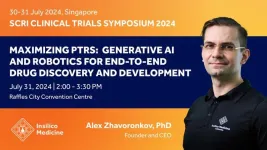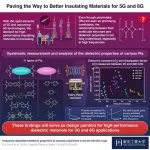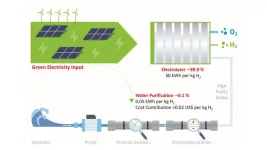(Press-News.org) An international team of scientists, including two researchers who now work in the Center for Advanced Sensor Technology (CAST) at UMBC, has shown that twisted carbon nanotubes can store three times more energy per unit mass than advanced lithium-ion batteries. The finding may advance carbon nanotubes as a promising solution for storing energy in devices that need to be lightweight, compact, and safe, such as medical implants and sensors. The research was published recently in the journal Nature Nanotechnology.
Sanjeev Kumar Ujjain, from CAST, was a lead researcher on the work. He started the project while at Shinshu University, in Nagano, Japan, and continued after arriving at UMBC in 2022. Preety Ahuja, from CAST, also contributed to the material characterization aspects of the research.
The researchers studied single-walled carbon nanotubes, which are like straws made from pure carbon sheets only 1-atom thick. Carbon nanotubes are lightweight, relatively easy to manufacture, and about 100 times stronger than steel. Their amazing properties have led scientists to explore their potential use in a wide range of futuristic-sounding technology, including space elevators.
To investigate carbon nanotubes’ potential for storing energy, the UMBC researchers and their colleagues manufactured carbon nanotube “ropes” from bundles of commercially available nanotubes. After pulling and twisting the tubes into a single thread, the researchers then coated them with different substances intended to increase the ropes’ strength and flexibility.
The team tested how much energy the ropes could store by twisting them up and measuring the energy that was released as the ropes unwound. They found that the best-performing ropes could store 15,000 times more energy per unit mass than steel springs, and about three times more energy than lithium-ion batteries. The stored energy remains consistent and accessible at temperatures ranging from -76 to +212 °F (-60 to +100 °C). The materials in the carbon nanotube ropes are also safer for the human body than those used in batteries.
“Humans have long stored energy in mechanical coil springs to power devices such as watches and toys,” Kumar Ujjain says. “This research shows twisted carbon nanotubes have great potential for mechanical energy storage, and we are excited to share the news with the world.” He says the CAST team is already working to incorporate twisted carbon nanotubes as an energy source for a prototype sensor they are developing.
END
UMBC scientists work to build “wind-up” sensors
Newly published Nature Nanotechnology paper shows that twisted carbon nanotubes can store high densities of energy to power sensors or other technology
2024-07-26
ELSE PRESS RELEASES FROM THIS DATE:
Researchers receive McKnight award to study the evolution of deadly brain cancer
2024-07-26
Scientist Dr. Aparna Bhaduri, assistant professor of medicine and biological chemistry, and neurosurgeon Dr. Kunal Patel, assistant professor of neurosurgery, both part of the UCLA Health Jonsson Comprehensive Cancer Center, have received the 2024 Neurobiology of Brain Disorders Award from the McKnight Endowment Fund for Neuroscience, which supports innovative research by U.S. scientists who are studying neurological and psychiatric diseases.
The award, $300,000 over the next three years, supports their efforts in gaining a deeper understanding of the microenvironment's role in shaping human glioblastoma, an aggressive type of brain cancer that is fast growing and difficult ...
Heather Dyer selected as the 2024 ESA Regional Policy Award Winner
2024-07-26
The Ecological Society of America (ESA) will present its 17th annual Regional Policy Award to Heather Dyer, Chief Executive Officer of the San Bernardino Valley Municipal Water District, Sunday, Aug. 4, 5:00 p.m. PDT, during the ESA Annual Meeting Opening Plenary. The ESA annual award recognizes an elected or appointed local policymaker whose record reflects the use of ecological science to inform policy decisions.
“ESA is honored to recognize Dyer,” said ESA President Shahid Naeem. “It’s rare for a biologist with ecosystems expertise to transition from technical science work to executive ...
New study disputes Hunga Tonga volcano’s role in 2023-24 global warm-up
2024-07-26
New research from a collaborative team featuring Texas A&M University atmospheric scientist Dr. Andrew Dessler is exploring the climate impact of the 2022 Hunga Tonga volcano eruption and challenging existing assumptions about its effects in the process.
The remarkable two-day event, which occurred in mid-January 2022, injected vast amounts of volcanic aerosols and water vapor into the atmosphere. Historically, large volcanic eruptions like Tambora in 1815 and Mt. Pinatubo in 1991 have led to significant cooling effects on the global climate by blocking sunlight with their aerosols. ...
Climate is most important factor in where mammals choose to live, study finds
2024-07-26
While human activity has had a massive effect on the natural world, a new study from North Carolina State University finds that climate is still the most influential factor in determining where mammals can thrive. The work sheds light on how climate change will affect wildlife populations.
Roland Kays, lead author of a paper on the work, said the study’s goal was to compare the importance of climate versus human factors in where mammals chose to live. To do so, researchers collected data on 25 mammal species from 6,645 locations across the United States. The study is one of the largest camera trap data analyses ever done. The data came ...
New study highlights global disparities in activity limitations and assistive device use
2024-07-26
A new study of over 175,000 people in 25 countries revealed that individuals in low- and middle-income countries face greater challenges with daily activities and are less likely to use assistive devices compared to those in high-income countries. These findings raise concerns about the global burden of disability, particularly in low-income countries.
Despite decreases in death and cardiovascular disease rates and increases in life expectancy worldwide, people in low- and middle-income countries still ...
Study finds targeting inflammation may not help reduce liver fibrosis in MAFLD
2024-07-26
Researchers at UCLA Health uncovered new information about the role inflammation plays in mitigating liver fibrosis, which is associated with metabolic-associated fatty liver disease (MAFLD), one of the most common diseases in the world affecting up to 40 percent of U.S. adults. While inflammation in the liver has long been considered a prerequisite to developing liver fibrosis, the scarring and thickening of tissue that can impair the liver’s ability to function, this new research suggests ...
Meet Insilico in Singapore: Alex Zhavoronkov PhD shares insights into various aspects of AI-powered drug discovery
2024-07-26
From July 30-31, Alex Zhavoronkov, PhD, founder and co-CEO of clinical stage artificial intelligence (AI)-driven drug discovery company Insilico Medicine will be attending SCRI Clinical Trials Symposium 2024 at Raffles City Convention Centre, and Brainstorm AI 2024: The New Race for AI at The Ritz-Carlton, Millenia Singapore, sharing strategic insights with global leaders across the technology and healthcare industries.
On 2:00 p.m, July 31, Alex Zhavoronkov PhD will be speaking at the session named “Methodologies and Considerations for ...
Insilico Medicine introduces Science42: DORA, the intelligent writing assistant for accelerated research
2024-07-26
Writing research papers is critical for disseminating scientific findings, but it does come with efficiency burdens, particularly for early-career researchers and non-native English speakers. A survey published in Nature in 2018 indicated that approximately 37% of respondents reported that they spend more than 20 hours a week on writing and revising scientific papers.
Recent progress in Natural Language Processing (NLP) technology, particularly with the rise of Generative Pre-trained Transformers (GPT) and other Large Language Models (LLMs), has equipped researchers with a powerful set of tools for processing extensive amounts of literature ...
A deep dive into polyimides for high-frequency wireless telecommunications
2024-07-26
As 5G technologies continue to evolve, scientists and engineers are already exploring new ways to turn things up a notch for 6G. One of the biggest challenges to address in both 5G and 6G is the many detrimental effects that operating at extremely high frequencies has on wireless communications. At frequencies nearing the terahertz range, problems such as signal attenuation and interference are more prominent, and maintaining signal integrity becomes much harder.
Some of these issues can be greatly mitigated by using insulating materials with exceptional dielectric properties. Glass- and ceramic-based insulating materials ...
Green hydrogen from direct seawater electrolysis- experts warn against hype
2024-07-26
At first glance, the plan sounds compelling: invent and develop future electrolysers capable of producing hydrogen directly from unpurified seawater. But a closer look reveals that such direct seawater electrolysers would require years of high-end research. And what is more: DSE electrolyzers are not even necessary - a simple desalination process is sufficient to prepare seawater for conventional electrolyzers. In a commentary in Joule, international experts compare the costs and benefits of the different approaches and come to a clear recommendation.
Fresh water is a limited ...
LAST 30 PRESS RELEASES:
Scientists show how to predict world’s deadly scorpion hotspots
ASU researchers to lead AAAS panel on water insecurity in the United States
ASU professor Anne Stone to present at AAAS Conference in Phoenix on ancient origins of modern disease
Proposals for exploring viruses and skin as the next experimental quantum frontiers share US$30,000 science award
ASU researchers showcase scalable tech solutions for older adults living alone with cognitive decline at AAAS 2026
Scientists identify smooth regional trends in fruit fly survival strategies
Antipathy toward snakes? Your parents likely talked you into that at an early age
Sylvester Cancer Tip Sheet for Feb. 2026
Online exposure to medical misinformation concentrated among older adults
Telehealth improves access to genetic services for adult survivors of childhood cancers
Outdated mortality benchmarks risk missing early signs of famine and delay recognizing mass starvation
Newly discovered bacterium converts carbon dioxide into chemicals using electricity
Flipping and reversing mini-proteins could improve disease treatment
Scientists reveal major hidden source of atmospheric nitrogen pollution in fragile lake basin
Biochar emerges as a powerful tool for soil carbon neutrality and climate mitigation
Tiny cell messengers show big promise for safer protein and gene delivery
AMS releases statement regarding the decision to rescind EPA’s 2009 Endangerment Finding
Parents’ alcohol and drug use influences their children’s consumption, research shows
Modular assembly of chiral nitrogen-bridged rings achieved by palladium-catalyzed diastereoselective and enantioselective cascade cyclization reactions
Promoting civic engagement
AMS Science Preview: Hurricane slowdown, school snow days
Deforestation in the Amazon raises the surface temperature by 3 °C during the dry season
Model more accurately maps the impact of frost on corn crops
How did humans develop sharp vision? Lab-grown retinas show likely answer
Sour grapes? Taste, experience of sour foods depends on individual consumer
At AAAS, professor Krystal Tsosie argues the future of science must be Indigenous-led
From the lab to the living room: Decoding Parkinson’s patients movements in the real world
Research advances in porous materials, as highlighted in the 2025 Nobel Prize in Chemistry
Sally C. Morton, executive vice president of ASU Knowledge Enterprise, presents a bold and practical framework for moving research from discovery to real-world impact
Biochemical parameters in patients with diabetic nephropathy versus individuals with diabetes alone, non-diabetic nephropathy, and healthy controls
[Press-News.org] UMBC scientists work to build “wind-up” sensorsNewly published Nature Nanotechnology paper shows that twisted carbon nanotubes can store high densities of energy to power sensors or other technology




